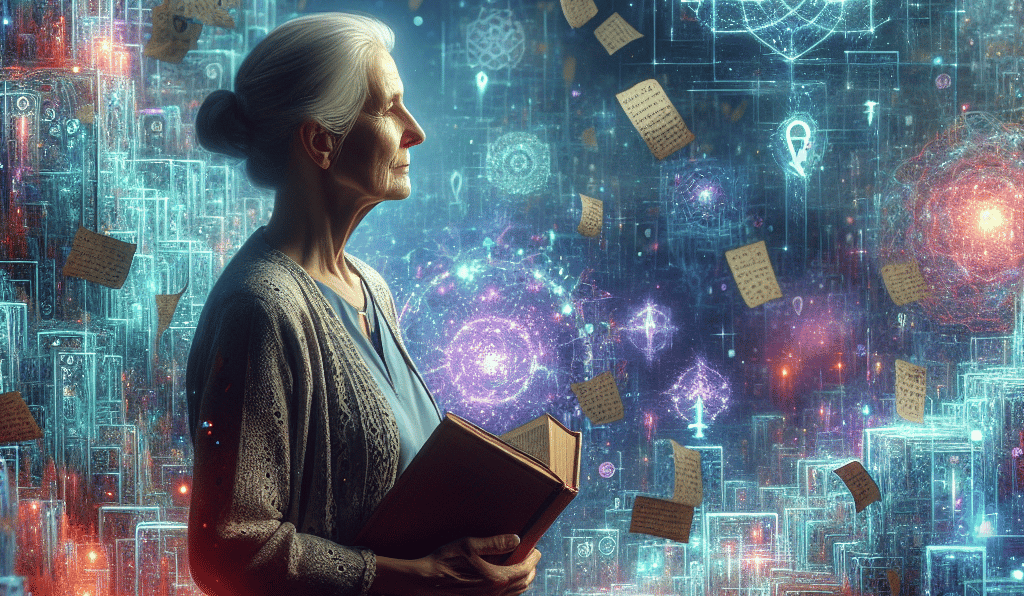Reawakening the Soul of Literacy in the Age of AI
Reviving soul in education vs. AI dominance
AIARTIFICIAL INTELLIGENCEEDUCATION
Eric Sanders
6/8/20254 min read


AI is swiftly changing the way we read, write, speak, and think—but it must not be allowed to hollow out our humanity.
In an era defined by technological acceleration, artificial intelligence has entered the classroom not just as a tool, but as a force threatening to redefine education itself. As AI-generated text becomes faster, more fluent, and increasingly indistinguishable from human writing, educators face an ominous question: What happens to human literacy and critical thought in a world where machines can do the thinking for us?
“Writing is no longer seen as an act of soul-searching but as an obstacle to be outsourced.” – Terrence O. Moore
This post is a call to resist that surrender. To preserve human dignity, we must rekindle the inner fire that makes reading and writing sacred acts—sources of thought, spirit, and meaning. Education must not only teach skills but awaken souls.
The Mechanical Threat and Our Personal Responsibility
The danger of AI isn’t found solely in external tools; it lies in how we allow those tools to shape us. Consider the rise of large language models like ChatGPT. They can generate essays, summarize books, compose poetry, and imitate human voices with stunning accuracy. But what they produce lacks one essential ingredient: the soul.
Students today are not just tempted—they are encouraged—to replace the hard work of thinking and writing with AI shortcuts. Where we once wrestled with difficult texts or wrestled with ideas on paper, now there’s a growing culture of passive consumption and delegation. The very labor that cultivates thought is slipping away.
I’ve seen this in conversations with students who now approach writing as a bother—something to offload rather than engage in. Reading, especially of deep and classic works, is often considered too slow, too irrelevant, too qualitative to be worth their time. This isn’t just about intellectual laziness; it reflects a deeper disconnection from meaning.
The erosion is happening from within. Nobody is making students use AI. But many no longer see any intrinsic value in doing the work themselves. Education has lost its metaphysical anchor.
Why Reading and Writing Were Always Meant to Be Sacred
True education has never only been about information transmission. At its best, education is an encounter with truth and beauty across time—a dialog between souls.
The act of reading great works used to demand something personal and demanding:
- Stillness, to listen to another voice across time.
- Interpretation, to understand ideas not immediately obvious.
- Reflection, to ask how those ideas resonate with truth in our own lives.
Likewise, writing wasn’t merely about communicating facts or passing tests. Writing allowed students to shape their inner landscape:
- Clarifying thoughts that seemed nebulous.
- Naming feelings that lay dormant.
- Articulating a moral or spiritual position in a confusing world.
This is what classical educators meant by the “formation of the soul.” It was never just mastering grammar and rhetoric. It was the discipline of becoming more human.
“Good reading and writing require both intellectual and moral development. There is no great writer who was not also a deep reader and an even deeper thinker.” – Terrence O. Moore
What We Lose When We Outsource the Mind
Let’s confront a sobering truth: if students no longer develop the ability to read deeply, write thoughtfully, and argue persuasively, they will become less capable of self-governance.
- They become vulnerable to manipulation—accepting surface-level narratives without questioning sources.
- Their grasp of history, politics, and culture becomes shallow—easily replaced by slogans and ideology.
- Most dangerously, they lose the internal compass that allows them to discern truth in a world cluttered with noise.
When AI begins writing for us, thinking for us, editing for us—our minds become both atrophied and programmable. Students lose not only the how of writing, but the why.
Here lies the heart of the matter: outsourcing thought begins a process of dehumanization. A machine can replicate patterns of speech, but it cannot understand what it means to suffer loss, fall in love, discover one’s purpose, or answer a call. These are not just “topics” for an essay—they are human experiences that reading and writing help us understand.
Rebuilding a Soul-Centered Education
If teachers and parents wish to push back against the encroachment of AI, they cannot do so with tech policies alone. They must reintroduce a vision of education that is radically human—built on wisdom, truth, and virtue.
What does this look like in a world increasingly dominated by digital distractions and algorithmic content?
- Reclaim the Classics: Give students texts that matter. Homer, Dante, Shakespeare, Austen, Douglass, and Dostoevsky do not simply teach literary technique. Their works lead students into the heart of what it means to live a good life. These texts demand both intellect and soul.
- Embrace Hard Reading: We must introduce students to texts that are difficult—syntactically, philosophically, and emotionally. Grappling with such works strengthens attention, humility, and intellectual stamina.
- Write With Purpose: Rather than assign writing only to demonstrate comprehension, educators should create writing assignments that ask students to confront real questions: What is justice? What does friendship require? What is worth dying for?
- Teach Language as Power: Teach students that their words can build or destroy—can bring beauty or deception into the world. Language is not neutral; it is a moral act.
These aren’t romantic ideals. They are the well-tested foundations of true literacy. A student who reads The Iliad learns not just Greek warfare but the cost of wrath. Writing on King Lear, a student isn't just analyzing motif, they are confronting generational betrayal, loyalty, and madness.
“Reading and writing well arise from love—love of truth, beauty, and the search for meaning.” – Terrence O. Moore
The Stakes Are Higher Now Than Ever Before
AI is not going away. Nor, in itself, is AI evil. But it poses a tragic temptation: to replace the long struggle toward understanding with speed, surface, and simulation.
If we allow AI to diminish the habits of soul-centered literacy, we risk more than academic mediocrity—we risk producing a generation incapable of self-reflection and civil discourse.
If education becomes fully mechanized, how will we raise free-thinking, morally grounded citizens in a democratic society?
When writing becomes just output and reading just information retrieval, the heart of education dies.
Where Do We Go From Here?
This is not a problem we can solve only with firewalls and plagiarism checkers. It will take a cultural reawakening—by teachers, parents, and students alike—who believe that education is more than productivity.
It will take communities who choose:
- Conversation over consumption
- Contemplation over convenience
- Purpose over performance
AI may write impeccable prose—but only a human can pause, choose the vulnerable word, and mean it.
So, we must ask ourselves: What kind of people do we want to become—and how can our schools help us become them?
Will we educate souls, or will we manage data?
The answer begins with how we choose to read, write, and speak today.
Efficiency
Transform your workflows and reclaim your time.
Contact Us
Need A Custom Solutions? Lets connect!
eric.sanders@thedigiadvantagepro.com
772-228-1085
© 2025. All rights reserved.
